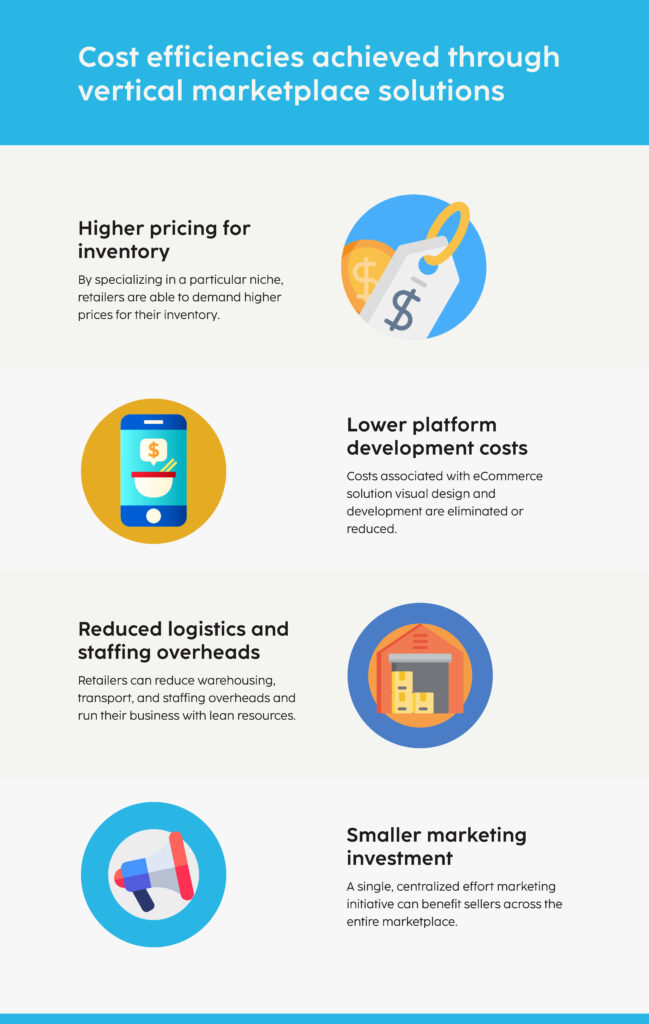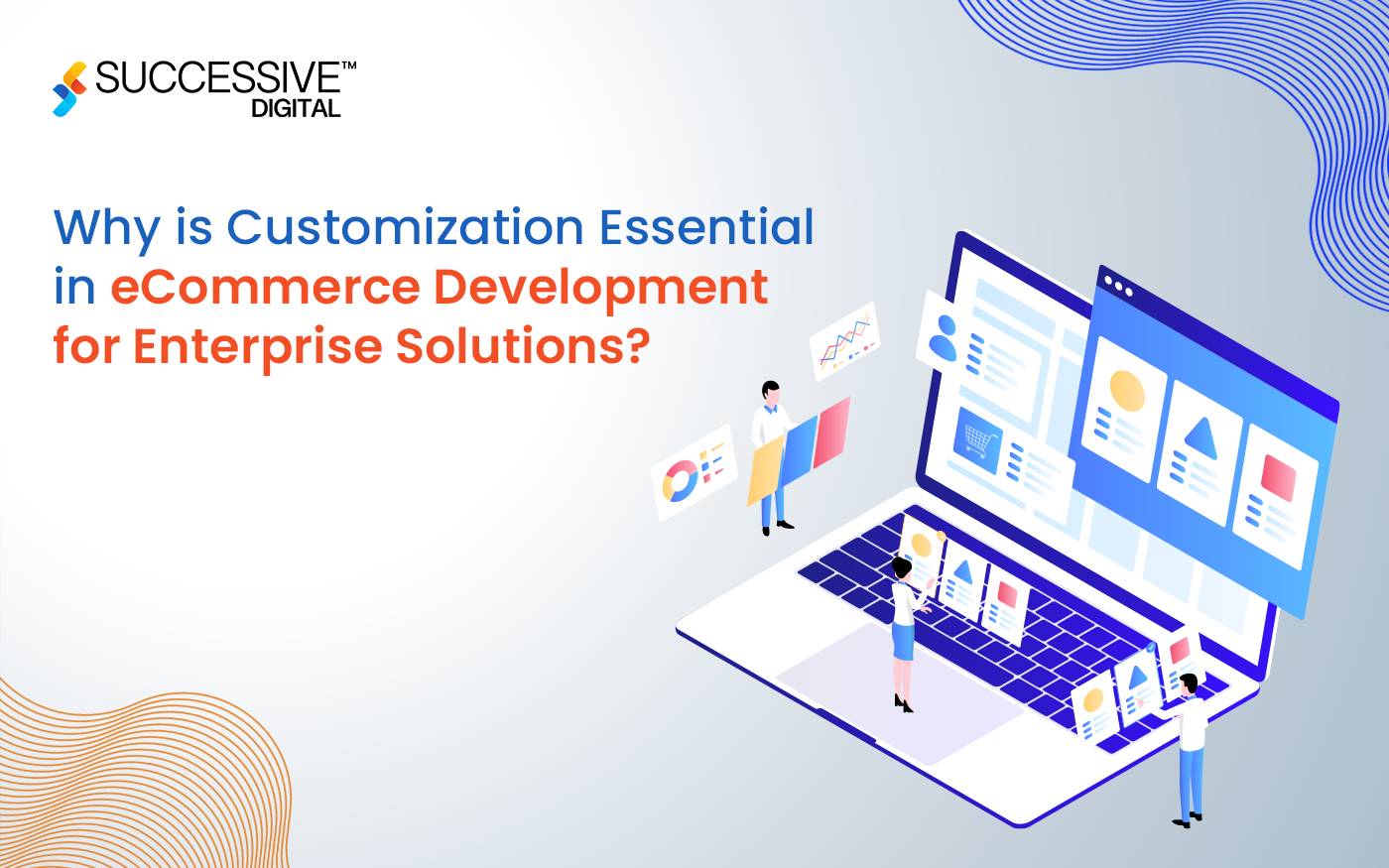Ecommerce has always been dominated by a few big players. In the United States, as of February 2021, 51.8 percent of the market share in the retail ecommerce space was taken up by the top three aggregators: Amazon (40.4 percent), Walmart (7.1 percent), and eBay (4.3 percent).
However, building a generic multi-vendor ecommerce marketplace solution can be an expensive proposition. Traditionally, companies not only have to develop their own ecommerce solution, but they also have to add marketplace functionalities, onboard sellers and their catalogs, manage orders, and market themselves.
Despite being more sustainable than regular online storefronts, since this reduces inventory challenges and adds significant product variety, it still leads to a long go-to-market and costs millions of dollars. This creates a major entry barrier for most businesses.
The journey to verticalized collaborative commerce
In response to this challenge, brands are now choosing to create niche ecommerce marketplace solutions within their own industry, where multiple retailers and service providers can work together to offer more value to the customer. This is an example of the growing shift towards collaborative commerce, the next phase in the evolution of retail.
White label marketplace software and plugins, such as Marketcube, make it possible for such businesses to set up a plug-and-play marketplace platform in a subscription model. In this way, vertical marketplaces are able to offer a larger product assortment and greater convenience to customers, simplify vendor and seller onboarding, and simultaneously reduce operational overheads and costs.
Here are 4 reasons why vertical marketplaces are the defining trend in ecommerce today.
More specialized, more memorable
By limiting themselves to a particular niche, vertical ecommerce marketplace solutions are able to offer more localized and specialized products to customers. The vertical marketplace concept allows brands to differentiate on the basis of quality, knowledge and expertise, and the variety of products offered within their niche.
Quality over quantity
With greater specialization, the focus shifts to offering better quality products rather than selling everything under the sun. Brands are able to distinguish themselves for selling products with a unique emphasis on quality, heritage, originality, innovation, and other such aspects.
For instance, UK-based Not On The High Street is a platform for small businesses selling unique creative products. Through branding, images, creative copy, and independent reviews, each seller is able to highlight the most impressive aspects of their brand on the storefront and craft a distinctive identity for themselves. This makes their brand and products memorable to customers, encouraging repeat sales.
Easier to establish brand authority
This narrow focus also gives retailers the opportunity to highlight their expertise in the form of specialized knowledge or years of experience in the industry. Brands with unique insights to offer can engage with customers through educational content. With less intensive competition, they can position themselves as authorities in their market and potentially dominate the industry.
Greater choice
Horizontal marketplaces (like Amazon or eBay) sell a large number of products but don’t necessarily offer customers enough variety within any particular product category. With a multi-vendor ecommerce marketplace solution that specializes in one niche, customers get more choices within each category of product and can be assured that they’ll find a product that is suited to their needs and budget.

A well-defined audience
Within an industry niche, customer groups can be more easily defined and segmented. This makes them easy to reach with targeted campaigns. In the long run, this means businesses can hit the ground running with a smaller initial marketing investment.
As an example, Petit Vour is a marketplace specializing in non-toxic, vegan, and ethically made beauty products. Having established themselves in this niche, the brand would find it relatively easy to identify and target customer groups based on their interests and activities across different channels. Without this specialized focus, the customer group would be larger but far harder to define and reach using appropriate channels.
[Read more about High-Profit, High-Growth E-Commerce: 5 Ways to Increase the Profitability of Your E-Commerce Business]
Heightened control over customer experience
A narrow focus also allows retailers to offer experiences that are relevant and valuable to their customers, and which pave the way for long-term relationships with customers.
Relevant solutions and support
Because of their industry focus, retailers can offer specialized solutions, better customer support, and clear policies centered around their particular industry.
For instance, depending on the industry, the return window may need to be made longer or shorter. The cost of offering free shipping for returns may have to be weighed against the customer acquisition cost, and decisions made accordingly. With items like electronics or home appliances, there may be conditions related to warranties and customer service that need to be established. Different industries also have different standards for maintaining product quality.
Retailers focusing on a particular niche can get set up faster with clear processes and policies applicable at scale, and fewer errors and missteps along the way. This leaves them with more time and resources available to focus on growth and development.

Value-driven, customer-centric approach
Departing from the utilitarian experiences offered by large aggregators, vertical marketplaces can offer more experiential and inspirational content. They can cater to specific desired buyer experiences, creating intimacy and connection with customers. Better personalization translates into deeper engagement and greater brand loyalty — which is even more significant now considering the COVID-related decline in in-store traffic.
An example of a brand offering such experiences is Misfits Market. This direct-to-consumer produce delivery service partners with farms to source high-quality food that would go to waste in a grocery store because of minor imperfections. This appeals to customers who care about the issue of food insecurity. And the brand keeps customer engagement high by sharing content featuring recipes, how-tos, and stories on its blog and social media channels.
Lasting relationships
On large aggregator platforms, products and transactions are at the forefront rather than brands or experiences. But with vertical ecommerce marketplace solutions, buyers and sellers have the opportunity to communicate about values rather than transactions. They can form connections based on their shared beliefs, become part of the same community, and get to know each other. This helps build lasting relationships that continue to bring in repeat business.
Uncovering cost efficiencies
Through vertical ecommerce marketplace solutions, sellers can leverage their industry expertise to price their products higher. And through their partnership with other sellers, many costs (such as warehousing and logistics) can be eliminated or reduced.

Floom is an online marketplace for independent florists in the US and UK. Recognizing that florists were often struggling with operations and finding it difficult to create their own websites, the founders launched FloomX, which allows members to sell on Floom, sell directly via a bespoke website, and manage their orders in one place.
This is a great example of how businesses within a particular vertical can work together using online marketplace management software to realize efficiencies that would otherwise remain out of reach.
In conclusion
Joining forces with others in their industry to deliver vertical marketplace solutions is the next logical step for retailers today.
These solutions give customers access to a wider product assortment with a greater emphasis on quality, more engaging shopping experiences, and relevant support. At the same time, they allow vendors to easily reach their target audiences and harness economies of scale. Through the marketplace model, both customers and retailers can benefit from the long-term relationships that are founded in value delivered.
With a single-vendor online store, any failure of the online platform or supply chain leads to lost business. But by working together with others within their industry or niche, retailers can gain the advantage of centralized efforts and shared resources, thus eliminating a single point of failure for their business.
Customizable online marketplace management software provides a low-risk way for retailers to get started with building their marketplace solution. Through such solutions, retailers can launch quickly and deliver consistently, gaining the potential to dominate their industry in time.
Given the challenging market conditions retailers are facing today, vertical marketplaces can be the key to unlocking tremendous business growth.












